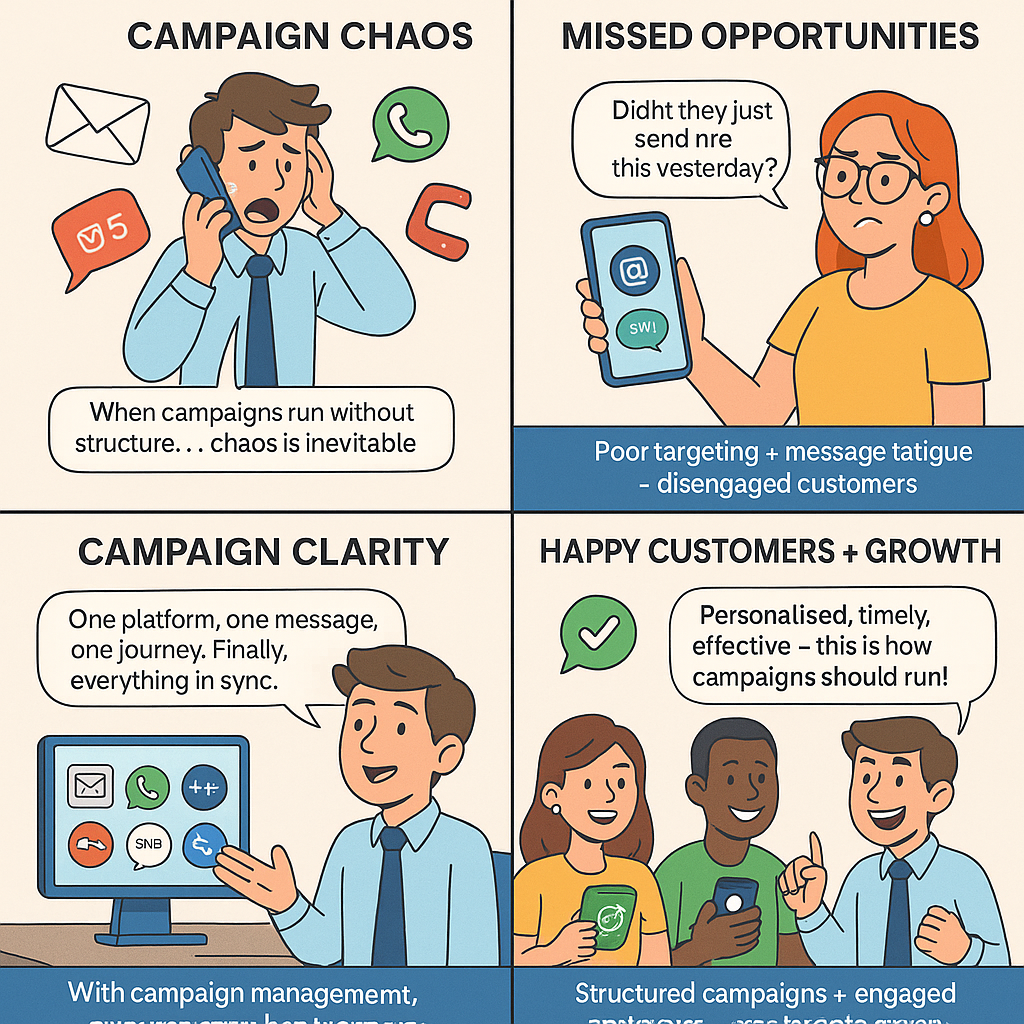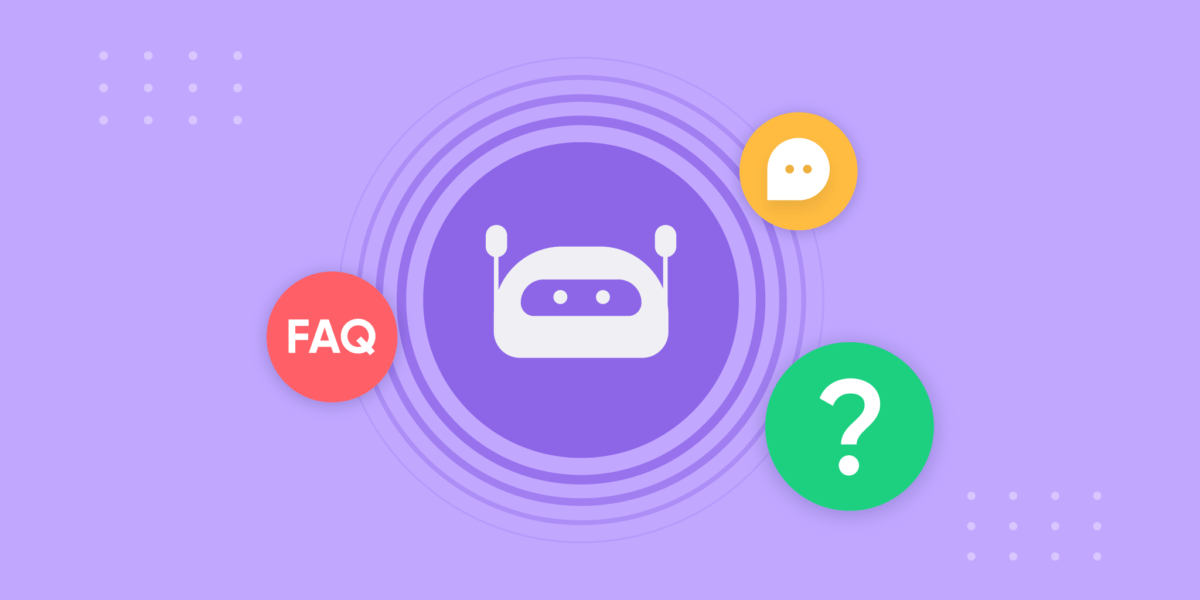Campaign Management 101: All You Need to Know!
- August 22nd, 2025 / 5 Mins read
-
 Aarti Nair
Aarti Nair

Campaign Management 101: All You Need to Know!
- August 22nd, 2025 / 5 Mins read
-
 Aarti Nair
Aarti Nair
Understanding Campaign Management
Imagine this: you’ve launched a new product after months of hard work. Your team has sent out emails, posted on social media, and maybe even run ads. But despite all the effort, the leads trickle in slowly, conversions are low, and you’re left wondering — what went wrong?
This is a common story for many businesses. The issue usually isn’t the product, but the lack of structured campaign management. Without a clear process to plan, execute, and measure campaigns, even the best ideas can fall flat.
Data backs this up. According to Gartner, 65% of marketing leaders say they struggle to effectively manage campaigns across multiple channels. And in the B2B space, HubSpot reports that companies running well-structured campaigns generate 55% more leads than those relying on ad-hoc tactics.
So, what is campaign management, and why should your business care? In simple terms, it’s the end-to-end process of planning, running, tracking, and optimising marketing initiatives — whether it’s a product launch, a customer retention campaign, or outreach for lead generation.
In this guide, Campaign Management 101: All You Need to Know!, we’ll break down the essentials:
-
What campaign management really means.
-
Why it’s critical to business growth.
-
The key steps and types of campaigns you should know.
-
The best tools and solutions — including how Verloop.io’s outreach solution can help you scale.
Before we dive in, let me ask you:
- Do your campaigns run like a repeatable system, or do they feel more like one-off experiments?
- And are you confident you’re capturing and converting every opportunity from your efforts?
If those questions give you pause, you’re in the right place.
What is Campaign Management?
Campaign management is more than just sending out emails or running ads — it’s the end-to-end process of planning, executing, tracking, and refining marketing initiatives to achieve a specific goal. That goal might be generating leads, launching a new product, or retaining loyal customers, but the principle remains the same: every action is part of a structured, measurable system.
Think of it as the bridge between strategy and execution. A well-managed campaign ensures that messaging, channel selection, and performance measurement all work together — instead of happening in silos. This structure is what separates successful marketing teams from those running disjointed one-off activities. In fact, Salesforce found that 70% of high-performing marketing teams follow a defined campaign management framework, while only 35% of underperforming teams do the same.
Pillars of Campaign Management
At its core, campaign management usually involves three key stages:
-
Planning: Defining objectives, audiences, budgets, and timelines.
-
Execution: Running the campaign across chosen channels such as WhatsApp, email, voice, social, or paid media.
-
Tracking & Optimisation: Measuring results in real time and adjusting tactics to improve performance.
When these steps are coordinated, campaigns don’t just run — they scale effectively. McKinsey research shows that businesses with structured campaign management processes achieve 25–30% higher marketing ROI, proving that process and consistency pay off.
For example, a company launching a new product might design a campaign that combines email nurturing with WhatsApp updates and outbound voice outreach. Instead of relying on guesswork, every stage is tracked — from open rates to booked demos — creating a clear picture of what works and what needs adjustment.
In short, campaign management turns marketing from an experiment into a system — one that consistently drives measurable results.
What is The Importance of Campaign Management?

In a world where customers are bombarded with messages across email, WhatsApp, social media, and ads, it’s no longer enough to “just run a campaign.” What truly matters is how well those campaigns are planned, connected, and optimised. This is where campaign management proves its value.
A well-managed campaign ensures that your message is consistent across channels, your audience targeting is sharp, and your outcomes are measurable. Without this structure, businesses risk wasting resources on fragmented efforts that fail to move the needle.
The impact is clear: according to HubSpot, marketers who run coordinated campaigns are 356% more likely to report success in achieving their goals compared to those running ad-hoc tactics. And Demand Metric found that companies with strong campaign management processes see a 20% increase in sales productivity and a 15% boost in revenue.
But the importance goes beyond numbers. Effective campaign management also builds trust and brand recall. Imagine receiving an email about a new product, a WhatsApp reminder for a demo, and a follow-up call from a sales rep — all consistent in tone and message. For the customer, that experience feels seamless. For the business, it translates into stronger engagement and higher conversion rates.
According to a study by Google, digital ads can boost brand awareness by 80%, underscoring the unmatched importance of campaign management in the digital landscape.
We highlight four important use cases of campaign management below.
1. Consistent Brand Messaging
Campaign management ensures that all marketing endeavors align with the brand’s voice, beliefs, and goals. This cohesion helps maintain a consistent brand image across diverse platforms, facilitating easy recognition and understanding by the target audience.
2. Efficient Resource Allocation
A well-structured campaign management process enables businesses to optimize their funds, time, and human resources. This efficient resource allocation prevents unnecessary cost escalations and ensures the best return on investment (ROI).
3. Precision in Targeting
Campaign management assists companies in identifying their ideal customers and devising tailored strategies to reach them effectively. Understanding the demographics, behaviors, and preferences of the target group allows for the creation of campaigns that resonate with their needs.
4. Measurable Results
Implementing this system allows companies to monitor and evaluate the effectiveness of their marketing initiatives. Key performance indicators (KPIs) can be established to gauge campaign performance, identify areas for improvement, and inform the planning of future campaigns based on data-driven insights.
Putting Campaign Management into Action
1. Define Campaign Goals
Clearly articulate the campaign’s objectives, ensuring alignment with broader marketing and business goals. Whether it’s brand awareness, website traffic, customer acquisition, or sales, clarity on goals is foundational.
2. Identify the Target Audience
Conduct in-depth research on the target audience’s background, hobbies, and preferences. This information facilitates the creation of ads that are not only relevant but also resonate with the audience’s wants and needs.
3. Craft a Comprehensive Plan
Develop a detailed plan encompassing the campaign’s message, creative assets, media platforms, budget, and schedule. The plan should seamlessly integrate with the brand’s identity and overarching marketing strategy.
4. Execute the Campaign
Implement the devised strategy across chosen channels, be it traditional media, social media, email marketing, or search engine ads. Maintain a vigilant eye on campaign progress, making necessary adjustments to optimise results.
5. Track and Analyse Results
Optimise tracking tools to monitor the campaign’s performance continually. Evaluate critical metrics such as ROI, click-through rates, and conversion rates. Leverage the insights gained to enhance future campaigns and refine overall marketing tactics.
This system stands as a linchpin in the realm of marketing, empowering businesses to create impactful campaigns that resonate with their target audience and yield optimal results. By adopting a structured approach and harnessing data-driven insights, companies can not only stay competitive in a crowded market but also build brand trust and foster long-term growth.
Types of Marketing Campaigns to Consider
Not all campaigns serve the same purpose. Depending on your business goals, you may run campaigns to build awareness, capture leads, or deepen customer loyalty. Here are some of the most common and effective types of marketing campaigns to consider:
1. Awareness Campaigns
These campaigns focus on putting your brand in front of the right audience. They are often top-of-funnel efforts designed to increase visibility and recognition. For example, an awareness campaign might include social media ads, influencer partnerships, or thought-leadership content. According to Nielsen, brand awareness campaigns can increase sales by up to 23% when executed consistently across channels.
2. Lead Generation Campaigns
The goal here is to capture new prospects and nurture them into your pipeline. Tactics often include gated content, webinars, email sign-ups, or landing pages optimised for conversions. In B2B, lead generation campaigns are critical — LinkedIn reports that 80% of B2B marketers consider lead generation their top priority.
3. Customer Engagement & Retention Campaigns
Winning new customers is only half the battle — keeping them engaged is where long-term growth happens. These campaigns use personalised offers, loyalty programs, or regular touchpoints (like newsletters or WhatsApp updates) to maintain relationships. Studies show that increasing customer retention by just 5% can boost profits by 25–95% (Bain & Company).
4. Sales/Revenue-Focused Campaigns
These campaigns are designed with a direct focus on driving sales. Flash sales, festive promotions, limited-time discounts, and product bundles fall into this category. For example, during holiday seasons, e-commerce companies rely on such campaigns to achieve revenue spikes.
5. Outreach and Voice/SMS Campaigns
Outreach campaigns are about meeting customers where they are — often through proactive channels like voice calls, SMS, or WhatsApp. These campaigns help businesses connect directly with prospects, qualify leads, and book appointments. With the rise of Voice AI Agents and SMS automation, outreach campaigns have become smarter and more scalable.
Each campaign type plays a role in the bigger picture of marketing. The key is to align the campaign objective with your overall business goals — whether that’s building visibility, capturing leads, or driving conversions.
Tools and Solutions for Campaign Management
Even the best campaign ideas can fall flat without the right tools to support them. As campaigns scale across multiple channels — email, WhatsApp, SMS, voice, and social — it becomes almost impossible to manage them manually. That’s where campaign management platforms come in. They help businesses plan, automate, personalise, and analyse campaigns, ensuring that every touchpoint contributes to measurable growth.
Instead of thinking of them as “nice-to-have,” these tools are now the backbone of modern marketing operations. According to Forrester, 77% of marketers using automation platforms report higher conversions compared to those managing campaigns manually. But not all tools are created equal — and each serves a different purpose.
1. CRM-Driven Campaign Tools
Platforms like HubSpot and Salesforce connect campaigns directly to customer data. This makes personalisation easier — whether it’s sending targeted email sequences or tracking how a sales call links back to earlier campaign touchpoints. Businesses that rely on CRM-integrated campaigns often see stronger alignment between marketing and sales.
2. Marketing Automation Platforms
Solutions such as MoEngage, Braze, and CleverTap specialise in multi-channel automation. They allow marketers to:
-
Segment audiences by behaviour.
-
Trigger messages at the right time.
-
Run complex workflows across email, push notifications, SMS, and apps.
For example, MoEngage enables brands to orchestrate journeys based on customer behaviour, ensuring that campaigns feel personalised rather than one-size-fits-all. This makes it particularly valuable for industries like retail and fintech, where timing and context drive conversions.
3. AI-Powered Outreach Solutions
While traditional automation platforms push messages out, AI-powered outreach tools focus on two-way engagement. This is where Verloop.io stands out.
Verloop.io’s Outreach Solution helps businesses go beyond static campaigns by enabling:
-
Conversational Outreach via WhatsApp, SMS, email, and Voice AI Agents.
-
Personalisation at Scale: messages tailored to context and intent, not just segments.
-
Real-Time Engagement: Voice AI Agents and chatbots that can answer queries, qualify leads, or book appointments instantly.
-
End-to-End Analytics: so marketers can see which messages resonate, which campaigns convert, and where to optimise.
Unlike tools that simply distribute content, Verloop.io ensures that every campaign feels like a conversation with the brand — not just a broadcast. For businesses in e-commerce, BFSI, healthcare, and travel, this means better customer experiences and higher ROI.
Which Tool Should You Choose?
The right solution depends on your campaign maturity and goals:
-
If you need data-driven targeting, a CRM tool like HubSpot is essential.
-
If you want workflow automation across multiple channels, MoEngage or Braze are strong options.
-
If your focus is conversational, AI-powered outreach at scale, Verloop.io bridges the gap between automation and human-like engagement.
Common Challenges in Campaign Management (and How to Overcome Them)
Running campaigns sounds simple in theory — you define your audience, craft a message, and push it out across channels. But in reality, businesses often discover that campaigns are much harder to control at scale. Even with the right intent, poor execution can lead to wasted spend, disengaged customers, and disappointing ROI. Let’s look at some of the biggest campaign management challenges and how to overcome them.
1. Poor Targeting
One of the most common mistakes is casting the net too wide. Campaigns that try to speak to everyone usually end up resonating with no one. According to Epsilon, 80% of customers are more likely to purchase when brands offer personalised experiences — yet many campaigns still rely on broad, generic messaging.
How to fix it:
Leverage customer data, behavioural insights, and AI-driven segmentation. Modern tools like MoEngage allow marketers to target based on user behaviour and intent, while Verloop.io’s Outreach Solution helps personalise conversations in real time, ensuring each customer feels the campaign was designed just for them.
2. Message Fatigue (The “Spray-and-Pray” Approach)
We’ve all received endless promotional emails or WhatsApp messages that feel irrelevant. Instead of engaging customers, these tactics cause message fatigue — where audiences start ignoring your brand altogether.
How to fix it:
Focus on quality over quantity. Map out customer journeys and use AI-powered platforms to deliver the right message at the right stage. For example, a Voice AI Agent can remind a prospect about an abandoned cart without bombarding them with generic discounts.
3. Lack of Integration Across Channels
Customers don’t think in channels — they just expect a seamless experience. But many businesses run campaigns in silos: email here, WhatsApp there, social media somewhere else. The result? Inconsistent messaging and missed opportunities.
How to fix it:
Adopt an omnichannel campaign management solution that centralises communication. Platforms like Braze and Verloop.io allow businesses to unify outreach, so whether it’s SMS, email, or voice, the customer receives a consistent message and context follows them across touchpoints.
4. Difficulty Measuring Results
Launching a campaign is one thing — proving its effectiveness is another. Without clear KPIs and proper tracking, businesses struggle to tie campaigns to revenue outcomes. This often leads to repeating mistakes and misallocating budgets.
How to fix it:
Set clear goals (click-through rates, conversions, retention) before launching campaigns. Use tools with strong analytics and reporting dashboards to measure impact. Verloop.io, for instance, provides real-time campaign analytics, helping teams not only track performance but also optimise mid-campaign for better results.
The reality is that most campaign failures stem from a lack of structure and insight. By addressing these four challenges with AI-driven tools and structured workflows, businesses can transform campaigns from scattershot efforts into scalable, predictable growth engines.
Best Practices for Successful Campaign Management
Successful campaigns don’t happen by accident — they’re the result of careful planning, consistent execution, and continuous optimisation. If you want your campaigns to deliver measurable results, here are some best practices in campaign management to keep in mind:
1. Set Clear Objectives and KPIs
Every campaign should start with the question: what does success look like? Whether it’s generating 500 new leads, achieving a 20% increase in retention, or booking 100 demos, setting clear goals helps you align teams and measure impact effectively. Without KPIs, you’re flying blind.
2. Personalise at Every Stage
Generic campaigns no longer cut it. Customers expect messages tailored to their needs, behaviours, and context. According to McKinsey, 71% of consumers expect personalised interactions — and 76% get frustrated when this doesn’t happen. Use segmentation, behavioural triggers, and AI-driven tools like Verloop.io’s Outreach Solution to ensure your campaigns feel personal, not mass-produced.
3. Balance Automation with Human Oversight
Automation is powerful, but over-reliance can make campaigns feel robotic. Use automation to scale repetitive tasks, while keeping humans in the loop for strategy, creativity, and complex interactions. For instance, an AI Agent can qualify leads via WhatsApp or voice, and seamlessly hand off to a sales rep when needed.
4. A/B Test and Refine Campaigns
Even the best campaigns can improve. Run A/B tests on subject lines, call-to-action buttons, channel mix, and creative assets. Analyse the results, keep what works, and iterate on what doesn’t. The most successful campaign managers treat campaigns as living systems, not one-off efforts.
5. Keep Campaigns Customer-Centric, Not Product-Centric
The fastest way to lose attention is by making campaigns all about your product. Instead, focus on solving customer problems and adding value at each step. Ask yourself: does this campaign speak to the customer’s pain point, or just our sales target? Brands that lead with empathy and value consistently see higher engagement and loyalty.
Campaign management isn’t just about execution — it’s about building campaigns that connect, convert, and create lasting relationships. By combining data, personalisation, automation, and human insight, businesses can run campaigns that don’t just meet KPIs, but also strengthen brand trust.
Take Control of Your Campaigns to Drive Real Growth
Campaign management isn’t just another marketing task — it’s the foundation for sustainable growth. When done right, it ensures that every campaign is structured, measurable, and customer-focused. Businesses that rely on ad-hoc efforts often waste resources, while those with a clear process see stronger results and higher ROI.
This is where AI-driven tools make the difference. Platforms like Verloop.io’s Outreach Solution allow businesses to automate campaigns across WhatsApp, SMS, email, and voice, while still keeping the personal touch that customers expect. From personalised engagement to real-time analytics, these solutions transform campaigns into engines of growth.
The takeaway is simple: if you want your campaigns to cut through the noise, it’s time to invest in structured strategies and intelligent tools. The brands that master campaign management today will be the ones customers remember tomorrow.
If you’d like to learn more about this, our team would be delighted to guide you through. Schedule a demo today!
FAQs
1. What is campaign management in marketing?
Campaign management is the process of planning, executing, tracking, and optimising marketing campaigns across channels like email, WhatsApp, SMS, social, and voice. It ensures your campaigns are consistent, measurable, and aligned with business goals.
2. Why is campaign management important for businesses?
Without structured management, campaigns often become fragmented and ineffective. A clear process improves ROI, strengthens brand consistency, and ensures resources are spent on strategies that actually drive leads, revenue, and customer retention.
3. What are the main types of marketing campaigns?
Common types include:
-
Awareness campaigns to build visibility.
-
Lead generation campaigns to capture prospects.
-
Customer engagement and retention campaigns to nurture loyalty.
-
Sales-focused campaigns to drive revenue.
-
Outreach campaigns using voice, SMS, or WhatsApp for direct customer interaction.
4. What are some common challenges in campaign management?
Businesses often face challenges such as poor targeting, message fatigue, lack of integration across channels, and difficulty measuring ROI. These can be addressed with structured workflows and AI-powered tools.
5. What tools are best for campaign management?
It depends on your needs:
-
HubSpot, Salesforce for CRM-driven campaigns.
-
MoEngage, Braze, CleverTap for multi-channel automation and segmentation.
-
Verloop.io for AI-powered outreach — automating campaigns across WhatsApp, SMS, email, and voice with personalisation and analytics built in.
6. Can small businesses benefit from campaign management tools?
Absolutely. SMEs often face resource constraints, and campaign management tools help them automate repetitive tasks, personalise at scale, and track performance without needing large teams.
7. How do I measure campaign success?
Campaign success is typically measured by KPIs such as click-through rates, conversions, engagement levels, customer retention, and revenue impact. Advanced tools like Verloop.io provide real-time analytics so you can optimise while campaigns are still running.






